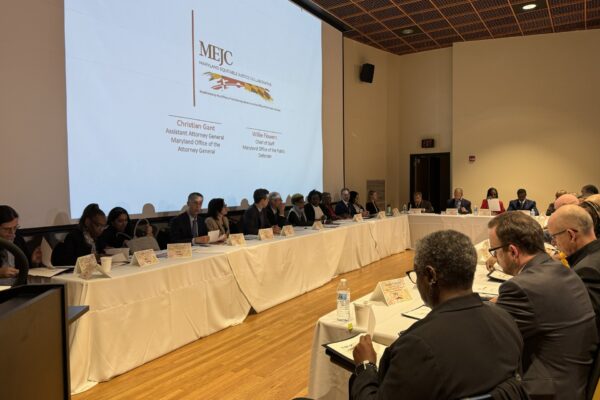This article was republished with permission from WTOP’s news partners at Maryland Matters. Sign up for Maryland Matters’ free email subscription today.
Maryland Attorney General Anthony Brown (D) and Maryland Public Defender Natasha Dartigue said some people view their offices as adversarial because of their different missions in the criminal justice system.
But on Wednesday at Bowie State University, they stood side-by-side to launch the Maryland Equitable Justice Collaborative.
“The truth is the [Office of the Public Defender] and the [Office of the Attorney General] are traditionally seen as opposite forces in the courtroom, adversaries on different sides of criminal law issues,” Dartigue said. “But today, we stand firmly together in collaboration. Why? The reason is simple. Mass incarceration, which is the systematic cycling of people from poor, marginalized communities in and out of jails and prisons, is a crisis in Maryland. We come together to eliminate the causes of mass incarceration.”
One main statistic they highlighted: about 70% of the state’s prisoners are Black, compared to 30% of the state’s overall population. The incarceration rate leads the country, the attorney general said.
Brown said he was surprised when Dartigue attended his swearing-in ceremony in January in Annapolis, which began the formation of an alliance.
“I said to Natasha then and I’ve said to her on multiple occasions since, and today we say publicly, that we are true partners in ensuring that the systems of justice in Maryland are in fact just,” he said. “This launch and this announcement represent for me what I believe in the 25 years that I’ve been in service to the state of Maryland, the people of this country, will be the most impactful initiative to change the lives of Marylanders.”
After both attorneys announced the launch of the collaborative, Brown said to reporters the initiative represents a comprehensive approach to not only ending systematic injustice against people of color, but also to keep communities safe.
“Those who commit crimes and violence, we’re going to hold accountable,” he said. “You can’t investigate and prosecute your way to safer neighborhoods because it certainly isn’t working in Maryland.”
Brown and Dartigue, who each represent the first people of color to serve in their respective offices, will co-chair the group that will be also known as MEJC.
About 40 people will be a part of the collaborative, including Vincent Schiraldi, secretary of the Maryland Department of Juvenile Services; Maryland Labor Secretary Portia Wu; Darren Popkin, executive director of the Maryland Chiefs of Police Association; and Earl Young, a returning citizen.
Retired U.S. District Court Judge Alexander Williams Jr., who will also serve on the group, shared his own background as a public defender and a prosecutor in Prince George’s County.
“I am part of the problem,” he said. “So, my hand has been a part and parcel of some of the issues that we’re going to be focusing on today.”
Meeting of the minds
Williams joined a couple dozen representatives from state government, academics, criminal justice advocates and returning citizens Wednesday to discuss the group’s mission, committee structure and review areas of reform.

The offices of the attorney general and public defender will partner with the Center for Education, Justice & Ethics at the University of Maryland, which is named after Williams. Bowie State University’s Institute for Restorative Justice is also part of the initiative.
Some of the focus areas include assessing law enforcement policies, developing a restorative juvenile justice system, establishing behavioral health and human services as an alternative to criminal penalties or incarceration, and reviewing criminal laws and sentencing procedures.
A short-term plan will be to produce legislative recommendations in January, the same month the General Assembly convenes in Annapolis.
One bill the legislature didn’t pass this year, Senate Bill 87, is expected to be re-introduced and supported by Brown. It passed almost unanimously in the Senate but died in the House Rules Committee.
The legislation would require money in the state budget to hire a full-time ombudsman and staff to oversee the state Department of Corrections.
One of the newly formed commission’s areas of potential reform deals with making sure prisons, jails and detention centers are “safe and humane environments” for those incarcerated and staff.
Qiana Johnson, founder and executive director of Life After Release in Prince George’s and a member of the group, asked if a representative with the state’s Division of Parole and Probation would be participating in the collaborative.
“We do have to pay attention to some of the folks who are trapped inside of cages because parole and probation…and all those other agencies aren’t 100% up to par,” she said.
Although a representative from the parole office wasn’t present Wednesday, Brown said that agency will be participating.
For anyone who couldn’t attend Wednesday, the group will host a public forum Nov. 6 at the Reginald F. Lewis Museum in Baltimore.
“The work is going to be difficult, and it’s going to be long. We’re not going to dig ourselves out in a matter of weeks and months,” Dartigue said. “As long as we are committed to the issues to eliminate mass incarceration, I do believe that we can make significant change in Maryland.”







